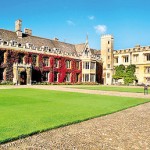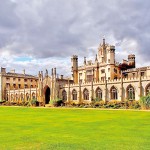QS World ranking top universities
View(s):
The University of Cambridge is a large non-profitable, public, higher education and research institution which was found in 1209.
The long history that goes back to 800 years makes it the second-oldest university in the English-speaking world and the fourth-oldest surviving university in the world. Located in the urban setting in the centre of the large ancient town of Cambridge, 50 miles north of London, East of England it is functioning with the Latin motto Hinclucem et pocula sacra which is translated to English as From here, light and sacred draughts.
Its six academic schools – Arts and Humanities, Biological Sciences, Clinical Medicine, Humanities and Social Sciences, Physical Sciences, and Technology – are spread across the university’s colleges, housing roughly 150 faculties and other institutions.
The academic calendar at Cambridge is divided into three terms: Michaelmas (fall), Lent (winter) and Easter (spring). English is the language of instruction at the university.
The university is home to over 100 libraries including college and department libraries, which, between them, hold more than 15 million books in total. In the main Cambridge University library alone, which is a legal depository, there are eight million holdings. The university also owns nine arts, scientific and cultural museums that are open to the public throughout the year, as well as a botanical garden.
The university has around 140 centres and institutes that contribute to different areas of research, such as the Centre of African Studies; the Cambridge Centre for Economic and Public Policy; and the Institute of Theoretical Geophysics. In a recent year, the university received around $415 million in research grants and contracts.
Cambridge is widely acknowledged as a vibrant place to be a student. The campus has its numerous listed buildings and many of the older colleges situated on or near the river Cam.
On the academic side, the university is home to over 100 libraries, which hold more than 15 million books in total. There are also nine world-renowned arts, scientific and cultural museums such as Kettle’s Yard and the Fitzwilliam Museum, which are open to the public throughout the year, as well as a botanical garden.
Cambridge University Press is a non-school institution and operates as the university’s publishing business. With over 50 offices worldwide, its publishing list is made up of 45,000 titles spanning academic research, professional development, research journals, education and bible publishing.
Extracurricular activities give students the chance to get involved with anything from the university’s renowned student drama societies, which spawned the likes of comedy group Monty Python, to music, politics and hundreds of other clubs and societies. The sports scene at Cambridge is huge too, with state-of-the-art facilities and over 80 sports on offer with teams for novices and experts alike.
With its reputation for academic excellence and traditional scholarly values, the University of Cambridge often ranks among the very top universities in the world for teaching, research, and international outlook. The university has educated eminent mathematicians, scientists, politicians, lawyers, philosophers, writers, actors and heads of state. Ninety-eight Nobel laureates and 15 British prime ministers have affiliations with Cambridge as students, faculty or alumni.
Cambridge contains 31 residential colleges, which are responsible for admitting undergraduate and graduate students; three colleges – Lucy Cavendish College, Murray Edwards College and Newnham College only facilitate women. Some small-group instruction also takes place at the colleges for undergraduates which give individual attention for students.
Most undergraduate students at the University of Cambridge are guaranteed college housing for at least three years. Many new graduate students can also utilize college housing. Around 20 percent of the student body is from outside of the European Union;tuition costs are higher for non-EU students and vary depending on the field of study.
Cambridge serves more than 18,000 students and has welcomed students from all cultures and corners of the globe. Nearly 4,000 of its students are international and hail from over 120 different countries. In addition, the university’s International Summer Schools offer 150 courses to students from more than 50 countries. In total, 92 affiliates of the university have been awarded Nobel Prizes, covering every category.
-Mdhusha Dep-








